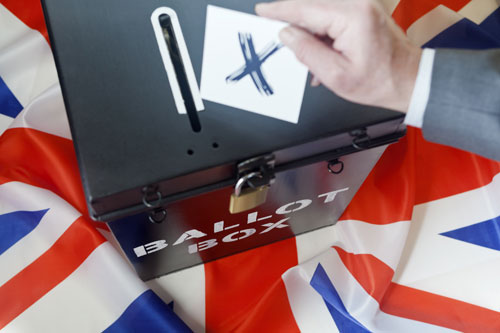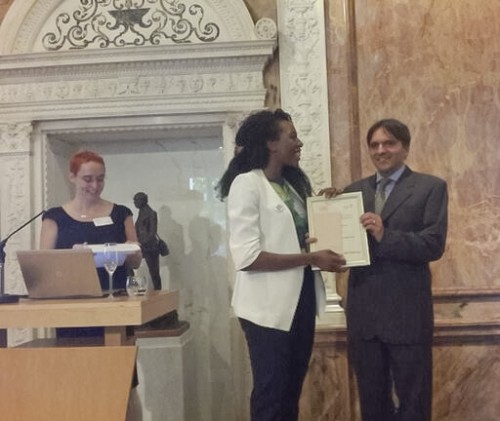Tag archives: Royal Society
Debating UK science

Science and the ballot box. (Courtesy: iStockphoto/stocksnshares)
By Michael Banks
Yesterday evening I went to the Royal Society in London to hear what the three main political parties in the UK have to say about science. The event was held because in May voters in the UK will be heading to the polls to choose their next government. The three parties had therefore sent their main science representatives to the Royal Society to spell out their intentions.
Chairing the debate was space scientist Maggie Aderin-Pocock of University College, London. She had the unenviable task of keeping science minister Greg Clarke (Conservative), Liberal Democrat science spokesperson Julian Huppert, and shadow universities, science and skills minister Liam Byrne (Labour) in check. For non-UK readers, it’s worth pointing out that the Conservatives have been in coalition with the Liberal Democrats since 2010.
View all posts by this author | View this author's profile
Women Rock Science author bags new student-science award

Hadiza Mohammed being presented with the inaugural IOP Student Science Publication Award last night.
The photo above shows me presenting the inaugural Student Science Publication Award, sponsored by the Institute of Physics and IOP Publishing, which publishes Physics World, to Hadiza Mohammed of the online magazine Women Rock Science. She is a working civil engineer currently doing a Master’s in advanced environmental and energy studies.
The award, which was launched this year, recognizes student journalists who produce a regular science publication and seeks in part to nurture the next generation of science writers. It forms part of the annual awards given by the Association of British Science Writers and was presented at a reception held at the Royal Society in London as the culmination of this year’s UK Conference of Science Journalists.
View all posts by this author | View this author's profile
Much ado about the LHC

Rolf-Dieter Heuer talking to journalists at the Royal Society, London.
(Courtesy: Tushna Commissariat)
By Tushna Commissariat
The Large Hadron Collider (LHC) at CERN has had its share of good and bad press over the past few years. Controversy and rumours abounded when the machine was switched on in September 2008. The mood then turned quickly to disappointment when its magnets failed and finally to euphoria when the first beams collided at 7 TeV in March 2010.
This week, a meeting to discuss the LHC and all things related was held at the Royal Society in London. The “Physics at the High Energy Frontier – the Large Hadron Collider Project” meeting took place on 16–17 May and saw leading lights of the project come together to discuss the collider and its future.
I was at the meeting for the second day, when a press briefing was held where CERN director Rolf-Dieter Heuer, plus Fabiola Gianotti and Guido Tonelli of the ATLAS and CMS experiments respectively, answered all of the questions that the Higgs-hungry reporters could throw at them!
The three speakers described how the collider has “surpassed all expectations” – experimental and computational. Talking about how the LHC is the very essence of global co-operation, Tonelli stressed that “no country could have done it as a stand-alone”. Heuer boasted that every year about 1000 students get their PhDs thanks to the LHC, while just the ATLAS experiment involves about 3000 researchers.
Explaining how things work at the LHC, Tonelli said, “We [experimental scientists] try to test the theory without prejudice. We ask our friends the theorists to come up with something that we can observe.” The collider has already produced the top quark in Europe for the first time and now it is poised to begin a regime of “new physics”, to look for supersymmetry (SUSY), multiple dimensions, matter–antimatter disparity and, of course, the Higgs boson.
The Higgs…or something else?
“We will have an answer to the Shakespeare question for the Higgs – ‘To be or not to be’ – by the end of 2012” declared a confident Heuer. While he did show a great deal of enthusiasm about discovering the Higgs, Heuer was also keen to point out that not finding the particle would be a great result in itself. “Not finding [the Higgs] when it does not exist is a success,” he exclaimed. “If it does not exist, we need to find something else that takes up the job of the Higgs and gives mass to elementary particles,” he added.
The LHC will run until the end of 2012 without any major breaks and Heuer is confident that it will decide the fate of the Higgs by the end of this run. “Physics will not be the same after 2012.” declared Tonelli. “It will change the view of the world.”
Not amused
One of the first questions, asked by BBC reporter Pallab Ghosh, was about the recent ”leak” of an unconfirmed sighting of the Higgs by ATLAS. A sighting that was later denied by a paper released by the ATLAS team and in interviews with physicists on various media channels.
“Unfortunately we live in a world of WikiLeaks, so it leaked!” said a grinning Gianotti. On a more serious note, she explained that such leaked results have not undergone the scientific scrutiny that is necessary, and hence are almost always insubstantial.
“The CERN management was not amused by the leak” said Heuer. He went on to ask journalists not to believe leaked results in the future. “Don’t trust it on first sight” he said. Although Heuer’s displeasure was clear, the leak did put the LHC back in the public eye after a few quiet months. Also, the media interest did provide the public with a rare insight into the vetting process that all scientific discoveries undergo. So perhaps the CERN management should lighten up and enjoy the renewed interest in the LHC!

Rolf-Dieter Heuer giving a talk about the future of the LHC at the Royal Society, London. (Courtesy: Tushna Commissariat)
Bumps and jumps
When asked about the Higgs-like ‘bumps’ seen at other experiments like the Tevatron and CERN’s Large Electron Positron Collider (LEP) the panel had mixed replies. The Tevatron bump was dismissed by Gianotti and Tonelli, as they both explained that it was too small, statistically speaking, and was only seen by one of the Tevatron’s two detectors. Would the LHC have a look for the Tevatron signal? “No”, was their reply.
However, “interesting events” seen at 115 GeV by the LEP just before its closure in 2000 are of interest to them. While Heuer did say that it is very difficult to determine if it was anything more than a “hint”, the LHC will be looking for the Higgs at that energy soon.

Colliding linearly
The International Liner Collider – a possible successor to the LHC – is another project that Heuer is excited about. He feels that CERN, with the LEP and now the LHC under its belt, would be the perfect host for the collider. “I think CERN has huge potential, not only on the human side, but on its experience side. We have all the instruments. So I see CERN in a very good position.” he said.
But what about the money? “If you have an excellent science case, you will get the money. Don’t ask for the money until you have the science figured out.” he said. He pointed out that, compared to the US, in Europe the politics of funding are more stable and for that reason CERN would be a better host.
Right: prototype microwave cavity for the ILC, illuminated for a “Science Night” in Hamburg. (Courtesy: DESY)
View all posts by this author | View this author's profile